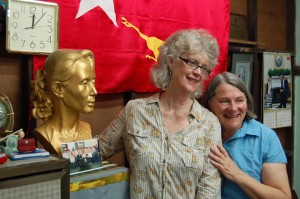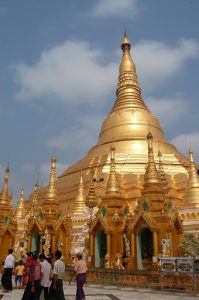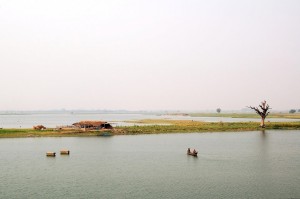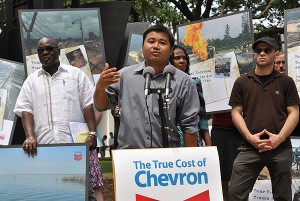 The following post was written by Nancy Penrose of Seattle about her recent trip to Burma with Global Exchange.
The following post was written by Nancy Penrose of Seattle about her recent trip to Burma with Global Exchange.
—
In April 2013, I was a member of the first-ever Reality Tour delegation to Burma. I chose to go with Global Exchange to this country that is also known as Myanmar* because I wanted to get beneath the typical tourist surfaces; I wanted to learn directly from the people themselves about their launch on the road to democratic reforms. By the end of the trip, I had been rewarded with a wide spectrum of conversations and insights. I felt humbled by the time that many busy people devoted to meeting with us.
We spoke with leaders of the Generation 88 Students, many of whom spent years as political prisoners and who now work to promote a peaceful and open society. In Yangon, at the headquarters of the National League for Democracy, the political party led by 1991 Nobel Prize winner Daw Aung San Suu Kyi, we met with a woman who holds an NLD seat in Parliament. Others we spoke with on this trip included hotel owners and managers, professors and businessmen, a Buddhist nun who has founded her own school, medical doctors, leaders of micro-finance programs, puppeteers, and even comedians who have paid the price of imprisonment for making jokes about the government. We chatted with vendors of tourist souvenirs and their children who were helping out during a school break.
Our delegation was small, only four of us, accompanied by our enthusiastic and knowledgeable guide, Cho, who was also our translator. It seemed that everyone we spoke with has high hopes for their country even as they assess and acknowledge the great challenges that must be overcome to continue on the path of democratic reforms.
Myanmar is emerging from 50 years of dictatorships that have morphed through military juntas and socialism and a kleptocratic group of powerful and wealthy men close to the military and known as “the cronies.” Significant steps toward democracy were taken in 2008; a quasi-civilian government was established in 2010; and in April 2012, NLD members stood for election and won 43 seats in Parliament. Reforms are launched, but five decades of dictatorships have left what is often a crumbling or nonexistent physical infrastructure and a citizenry that often needs empowering and educating about a government’s responsibilities and duties to its people.
We visited four places–Yangon, Mandalay, Bagan, and Inle Lake–and were delighted by beauty in each. In Yangon, there was the gleaming gold zedi, or stupa, of Shwedagon Paya, a temple that every Burmese Buddhist tries to visit at least once in his or her life. We were there on a Sunday, a day of no work for many Burmese, and we were surrounded by worshippers, families picnicking in the shade of pavilions, and novitiate processions where young boys preparing to join the monkhood were carried on the shoulders of friends and families under golden parasols. Near Mandalay, we strolled the famous U Bein Bridge and watched a farmer herd his flock of hundreds of ducks, saw women bent to their task of harvesting groundnuts from fields exposed and planted as Taungthanam Lake retreated with the dry season.
Near Mandalay, we strolled the famous U Bein Bridge and watched a farmer herd his flock of hundreds of ducks, saw women bent to their task of harvesting groundnuts from fields exposed and planted as Taungthanam Lake retreated with the dry season.  We spent a day on the Ayerarwaddy (Irrawaddy) River traveling from Mandalay to Bagan and were grateful for the shade of the woven rattan roof. (Temperatures in Yangon, Mandalay, and Bagan were hitting 40 degrees C (104 degrees F) or higher every day.) We watched the sun turn red as it cast its final rays of the day over the thousands of 11th- to 13th-century temples spread across the plain at Bagan. And finally, we admired the skills of the fishermen of Inle Lake who balance on the ends of their slender wooden boats and, in a delicate ballet, row with one leg wrapped around the paddle so that their hands are free to cast and retrieve their nets.
We spent a day on the Ayerarwaddy (Irrawaddy) River traveling from Mandalay to Bagan and were grateful for the shade of the woven rattan roof. (Temperatures in Yangon, Mandalay, and Bagan were hitting 40 degrees C (104 degrees F) or higher every day.) We watched the sun turn red as it cast its final rays of the day over the thousands of 11th- to 13th-century temples spread across the plain at Bagan. And finally, we admired the skills of the fishermen of Inle Lake who balance on the ends of their slender wooden boats and, in a delicate ballet, row with one leg wrapped around the paddle so that their hands are free to cast and retrieve their nets.
These indelible scenes are experienced by many tourists who travel to Myanmar, but as part of the Global Exchange delegation we added depth and context. We discovered the serene persistence and determination of a young Buddhist nun who runs a school in the suburbs of Yangon and who worries about the coming rainy season when the lack of drainage infrastructure may leave the school marooned by water for days at a time. We heard from Bagan’s Director of the Ministry of Culture about the challenges that arise owing to the limited funding available to preserve and protect this ancient and rich heritage site. We spoke with tourism officials who lament the lack of enough hotel rooms to serve the burgeoning numbers of visitors to Myanmar. We learned that in Yangon there are only 2,000 rooms considered tourist quality, even as tourist arrivals in Myanmar reached 1,000,000 in 2012, compared to some 800,000 in 2011. Toward the end of our trip, as we left the beauty and sweet cool air of Inle Lake, we met with the leader of the microfinance group Muditar, based in Nyaungshwe at the northern end of the Lake, who described their partnership with the Shanta project in Colorado and the midwifery, water, and coffee plantation projects they are undertaking with the Pa O tribal villages in the nearby mountains.
For me the trip was a kaleidoscope of experiences in the company of fellow travelers who care passionately about equality and positive social change in our world. My photos, journals, and souvenirs are all attempts to help keep the journey alive. Now, when I read about events in Myanmar, I understand so much more, I care, I pay attention. And I watch for ways to help.
*Regarding the question of using Burma or Myanmar, I refer readers to this article in Mizzima, a media organization formerly in exile that is now based in Yangon.
Would YOU like to travel to Burma and experience it for yourself? Join us in building people to people ties in Burma on an upcoming journey co-sponsored by Ethical Traveler.

